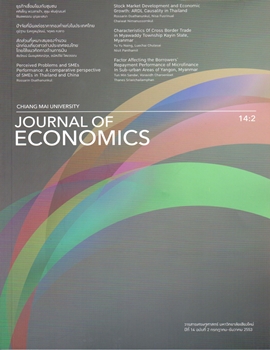Factor Affecting the Borrowers’ Repayment Performance of Microfinance In Sub-urban Areas of Yangon, Myanmar
Keywords:
Repayment Performance, Myanmar, Logit Model, Probability, Bad BorrowerAbstract
The main objective of this study is to investigate the factors affecting repayment performance of borrowers who are the members of the Young Women Development Project (YWDP), one of the religious organizations running under the Young Women Christian Association (YWCA), in three sub-urban areas; North Okkalapa, Insein and Hlaing Tha Yar, in Yangon, Myanmar.
Data for this study was collected by using a questionnaire to interview 400 members in the study area. Then the logit model was used in order to find out the factors affecting repayment performance of the borrowers. The outcome of this research shows both the borrower’s probability of increasing bad repayment and the probability of decreasing bad repayment in the credit provision. The use of binary choice in the logit model has resulted in the findings that seven respective important variables affected the probability of being a bad borrower. These problems, and the increased probability associated with them are health problems 85 %, female borrower 41 %, outside loan 39 %, lack of group pressure on repayment 22 %, primary level education 19 %, age between 20 to 40 16 % and street vending business 11 %. Five respective important variables were found to potentially decrease the probability of being a bad borrower . These were solidarity group agreements on repayment rate-70 %, less experienced borrower-20 %, occupation of household head-17 %, the use of loan amount in business investment-1.6 % and second priority of small home business - 13 %. In summary, the late repayment of members leads to them becoming delinquent borrowers due to the large effect of health problems , female borrowers with less knowledge in business and poor education, and outside loans with high interest rate.
Downloads
Issue
Section
License
All opinions and contents in the CMJE are the responsibility of the author(s). Chiang Mai University Journal of Economics reserves the copyright for all published materials. Papers may not be reproduced in any form without the written permission from Chiang Mai University Journal of Economics.






